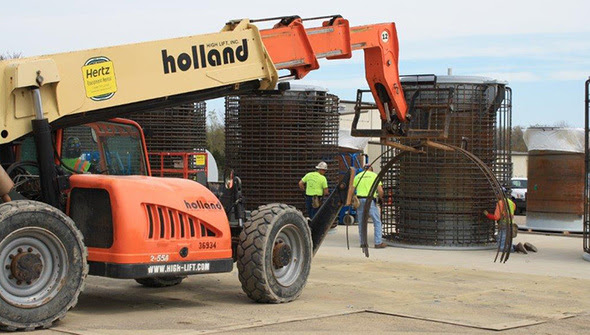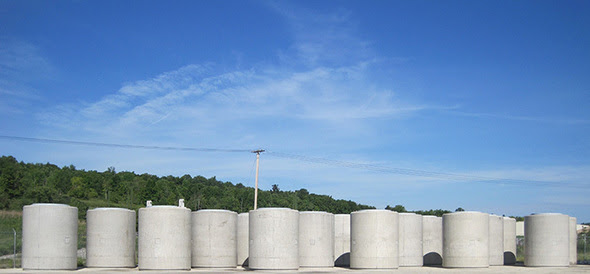EM’s West Valley Site is Halfway Complete Relocating High-Level Waste

Workers construct the vertical storage casks to contain the canisters of vitrified high-level radioactive waste.
WEST VALLEY, N.Y. – EM’s West Valley Demonstration Project (WVDP) has crossed the halfway mark in its work to relocate 278 canisters of vitrified high-level radioactive waste for eventual disposal offsite.
Relocating the canisters from the Main Plant Process Building to an
onsite storage pad is necessary before WVDP and contractor CH2M HILL
BWXT West Valley (CHBWV) can demolish that building and the
Vitrification Facility. The project marked the first time vitrified high-level waste was relocated for onsite interim storage in the U.S.
“This team has worked safely and tirelessly to plan, construct, train
and operate the specialized equipment to relocate the canisters from the
former reprocessing facility to allow for the demolition of the
building to begin in the spring of 2017,” EM’s WVDP Director Bryan Bower
said. “I could not be more proud of this team.”

Workers relocate a vertical storage cask.

A vertical storage cask is transported to the interim storage pad.

Vertical storage casks moved to the interim storage pad are shown here .
Workers on Aug. 30 moved the 29th of 56 vertical storage casks with
the 145th canister of vitrified waste about a half mile to the storage
pad. The relocation effort, which began in November 2015, is scheduled
for completion by December 2016, about one year ahead of schedule.
The project required years of extensive planning, design,
construction, and building modifications, and the purchase of special
transport equipment. Each cask — containing a stainless steel overpack
with five canisters — weighs about 87.5 tons. Built onsite, the casks
have 4-inch-thick steel liners and 20 inches of steel-reinforced
concrete, and are designed for use for at least 50 years. Their design
is based on spent nuclear fuel dry cask storage systems used throughout
the world, with modifications for long-term storage of vitrified
high-level waste.
Once the site of the first and only commercial nuclear fuel
reprocessing plant in the U.S., WVDP is now an environmental cleanup and
waste management project. In 1972, commercial nuclear fuel reprocessing
ceased in the Main Plant Process Building. Workers vitrified the waste
from 1996 to 2002, placing it into the 10-foot-tall canisters and
storing them inside the building.

No comments:
Post a Comment